
In this week's episode of Parallax, Dr Ankur Kalra welcomes Dr John Mandrola, a cardiac electrophysiologist practicing in Louisville and the host of the popular podcast "This Week in Cardiology" and author of Sensible Medicine, among other forums.
In this insightful episode, we delve into Dr Mandrola's career journey. He discusses how the beginnings of his career during a period of significant innovations and the reversal of expert opinions profoundly influenced his perspective on medicine, leading to a more conservative stance. Dr Kalra then invites Dr Mandrola to share the motivations that drive his work as a medical journalist and communicator, along with his methods of selecting studies to highlight in his writings and show.
Dr Mandrola emphasizes the importance of bedside medicine and the critical role of translating and interpreting evidence in modern healthcare. Together, Dr Kalra and Dr Mandrola explore the complexities of practicing medicine today and ponder the value propositions associated with the latest innovations.
Dr Mandrola sheds light on what he considers the most promising new advances in the field. He concludes the episode by offering valuable advice to our listeners, advocating for the implementation of innovations grounded in medical evidence and supported by sound policies.
Questions and comments can be sent to “podcast@radcliffe-group.com” and may be answered by Ankur in the next episode.
Guest: @drjohnm Host: @AnkurKalraMD and produced by: @RadcliffeCARDIO.



The charity organisation, Women as One is an agent for women and men to be part of medicine that is built on talent, rather than a privilege. Roxana and Ankur discuss the role of mentorship and family-friendly work environment in mending the broken house of cardiology. Roxana talks about the practical tools that are available for women to take the next steps in their career and achieve their goals.

Dr Kalra asks Dr Mauri about early influences and her traineeship with legendary interventionalists, the late Donald Baim and Richard Kuntz. Dr Mauri talks openly about her decision-making process and the importance of selecting your priorities and committing to them. Ankur asks Laura about her decision to go into industry. Laura shares her thoughts on medical innovations and meeting urgent needs with unique perspectives.
What is Dr Mauri’s advice for a young cardiologist? How did she balance research and patient care? What are the questions that helped her decision making? How does Dr Mauri think about innovations in medicine?

Brigham and Women’s Hospital’s Health Equity Committee decided to confront the status quo by asking: How is racism on a structural level present within our walls?
Ankur Kalra’s guests Michelle Morse (Founding Co-Director of EqualHealth and Assistant Professor at Harvard Medical School) and Lauren Eberly (Cardiology Fellow at the University of Pennsylvania) are co-authors of a retrospective study that demonstrated what had previously only been observed: That black or brown heart failure patients ended up in general medicine rather than specialised cardiology services. Following the publication of the study in November 2019, the Health Equity Committee started to roll out anti-racism trainings and to work on objective admission guidelines to mitigate biased behaviours.
Aarti Bhatt (Assistant Professor of Medicine at the University of Minnesota), member of the Minnesota chapter of Campaign Against Racism, talks about their initiative to support projects that have a positive impact on local communities on a global scale.

In this week’s Parallax, Dr Kanaa’N, the director of the program, and Dr Lahorra, chairman of the Heart, Vascular & Thoracic Department of Akron General introduce the listeners to the foundations of their program and the paradigm shift brought by TAVR.

Ankur Kalra asks Grant W Reed, Director of the Cleveland Clinic’s STEMI program, to reflect on the actions they took and the challenges of delaying cardiovascular procedures in the wake of the coronavirus pandemic. Dr Reed offers insight on the factors that influenced the Cleveland Clinic’s STEMI policy for COVID-19. Ankur and Grant discuss the triage considerations for patients with structural heart disease and the steps the clinic took to protect its healthcare workers.





